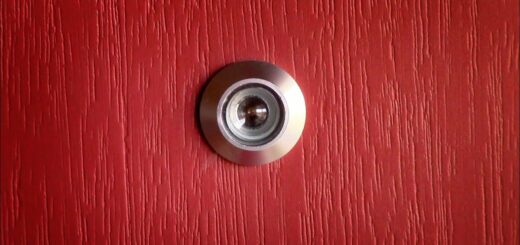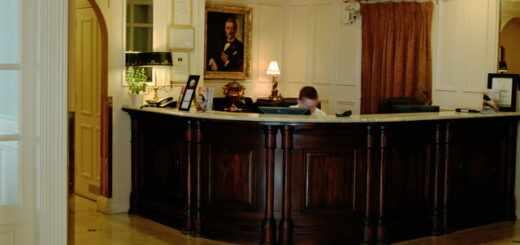The straight and narrow
It was a bright and breezy day when Tom Hobbes decided to burn down his shop. This was a fortunate coincidence since a wet rainy day would have made the building difficult to light. On the other hand, seeing the dry grass shivering on the meadows had been very much an inspiration. That and a deep and heartful desire to run away. Run away from it all and never come back.
Tom Hobbes was a slight man, barely five foot nine, and had recently taken to wearing glasses. He was not unliked in the village. In fact, he had taken pains to be as inoffensive as possible throughout his thirty nine years walking the earth. As a result, he was neither liked, nor disliked, nor really thought upon at all, despite owning the only shop in the village and speaking to its inhabitants on a predominantly daily basis.
His decision had been precipitated by one such encounter. He had been in the shop, refilling stock in the back room, when Mrs Johnson, a fierce creature with an appetite for both gossip and status, had entered the shop and begun banging on the bell.
“With you in a minute,” called out Tom who, at that point, was balancing a fairly hefty box of tinned goods above his head as he attempted to manoeuvre it onto one of the higher shelves.
The bell did not cease in its jangling.
“Just one minute,” called Tom, delicately shifting the box’s weight onto the shelf while being heartily aware that the base of the box, held together only with thick packing tape, was straining under the weight and directly above his head.
“Come on,” yelled Mrs Johnson from the front, “service. I can’t be waiting all day. Some of us have important business to attend to.”
With some effort, Tom slid the box until it was entirely supported, and then trotted to the service area. He plastered on a cheery smile, and approached the looming figure of Mrs Johnson.
“Now,” he said, “how can I help you?”
“You can help me by jumping back about five minutes and being here to assist me when I needed it,” retorted Mrs Johnson. “Although I fear even that would be beyond you.”
“Terribly sorry,” said Tom. “I’m afraid I was busy in the back room. Now, was it groceries you were after? I do believe we sent your usual delivery round to you yesterday?”
“I’ve come to complain.” Mrs Johnson reached into her handbag and pulled out a rather large and distinctly knobbly cucumber. She waved it in front of Tom’s face, forcing him to become temporarily cross eyed as he attempted to focus on the moving object.
“What appears to be the problem,” he asked as his eyes tracked from one side to the other.
“It’s bent,” said Mrs Johnson.
Realising he was in danger of imitating a snake confronted by a Bengali snake charmer, Tom refocused on Mrs Johnson and gave his best apologetic smile. “Bent?”
“Bent,” agreed Mrs Johnson. “Hooked. Bowed. Curvilinear.”
“Ah, bent,” said Tom. “May I?” He reached out and took the offending vegetable. It resembled a horticultural truncheon, regulation length and not a kink in it. Tentatively, Tom placed in on the countertop and gave it a nudge. If dutifully rolled in a line, past the container of stamps and lottery tickets, and straight off the edge.
Mrs. Johnson caught it without looking and brought it back to under Tom’s nose.
“Bent,” she insisted, and waggled it from one end. In the manner of a child’s magic trick, it did, indeed, now appear to possess all the properties of Indian rubber.
“I see,” said Tom. “Well, that really won’t do, will it. Why don’t I go and get a replacement for you?”
“I don’t want a replacement,” said Mrs. Johnson. “I want an apology.”
“An apology?” said Tom, a little vein in his head throbbing. “For a bent cucumber?”
“Indeed. It ruined my Waldorf salad. I’ll never be able to look the rotary club in the face again.”
Tom looked at the, clearly intact, vegetable. Or was it a fruit. He never could remember.
“Well,” he said, “I do sincerely apologise. Here at Hobbes groceries, we endeavour to give everyone the utmost satisfaction. I’ll do my best to make sure it never happens again.”
He smiled at Mrs. Johnson, while she frowned at him in withering anticipation.
“A written apology.”
The vein in Tom’s head began to pulse once more.
“I see,” he said. “And you’d like that here and now would you?”
“Of course,” said Mrs. Johnson. “Otherwise, how will you ever learn?”
“I see,” said Tom. “Well, I do happen to have a bit of paper around. Let’s see.” He looked around the back of the counter and came up with a notepad, the one that he used when someone requested a receipt, and a battered looking pen.
“In ink, mind you,” said Mrs. Johnson.
Tom looked at the biro he had in his hand. “This is ink,” he pointed out.
Mrs. Johnson looked thunderous. “With a fountain pen. And I want to see proper calligraphy. None of this modern shorthand rubbish.”
“Well,” said Tom. “I’ll do my best.” He attempted another smile. “I’m sure I never was the best at penmanship.”
“Then you will have to learn.”
Tom’s smile turned wan. Raising the counter, he came out past Mrs. Johnson and into the shop proper, heading right to where he kept the stationery. He took one of the more expensive fountain pens, in its cardboard wrapper, and a couple of ink cartridges, glancing back and smiling at Mrs. Johnson every minute or so to make sure she was still happy. Then he returned to the counter, closed the counter top, placed the unopened pen down next to the cartridges, positioned his receipt notebook, and started trying to work out how to open the packaging of the pen. Then he smiled at Mrs Johnson, reopened the countertop, heading back to stationery, retrieved a pair of scissors, walked back behind the counter, closed the countertop, opened the pen packet with the scissors, unscrewed the fountain pen, placed a cartridge within it, re-tightened the fountain pen, and began to write in his best and boldest handwriting.
“Black ink, please,” said Mrs. Johnson.
Tom looked at the drying blue letters on the paper in front of him.
“Why certainly,” he said and Mrs. Johnson was surprised at how ominous the breeziness of his tone had become. “I think there is just one thing that you and I need to sort out between us first.” And with that he reached for the scissors.
And so, Tom found himself in front of his shop, a closed sign attached to the door, and a mind full of matches. Perhaps, he thought to himself, he could move to a new village. One where no-one knew him, and he could re-build his reputation for polite, but inoffensive service. Certainly, it was unlikely that any of his neighbours would trust him again, not once word got round.
He glanced back into the shop. Mrs. Johnson was still there, exactly as he had left her, the shocked expression frozen on her face like a rictus. He didn’t know what had come over him. Certainly, Mrs. Johnson would never let him live it down. After all, he was known for his customer centric attitude. The customer is always right. In twenty years working in the shop, he stuck to that mantra through thick and thin.
And yet, when Mrs. Johnson had sneered at him, with her supercilious attitude and her, oh so straight Salad Bush cucumber, something had snapped. He’d done something he would never have considered doing to anyone else.
He’d charged her for the scissors.
And the fountain pen too.





Recent Comments